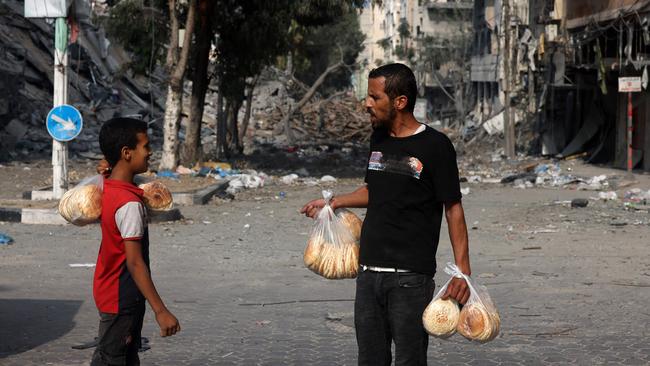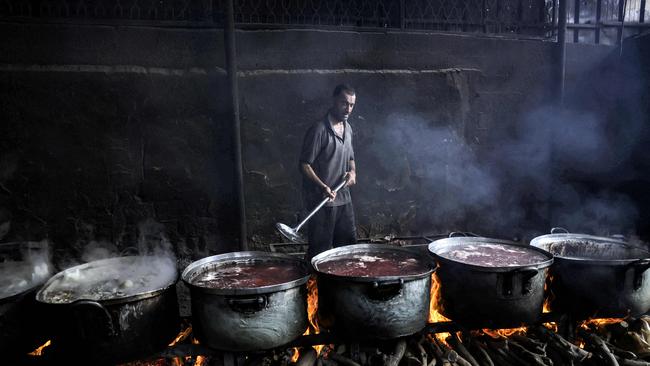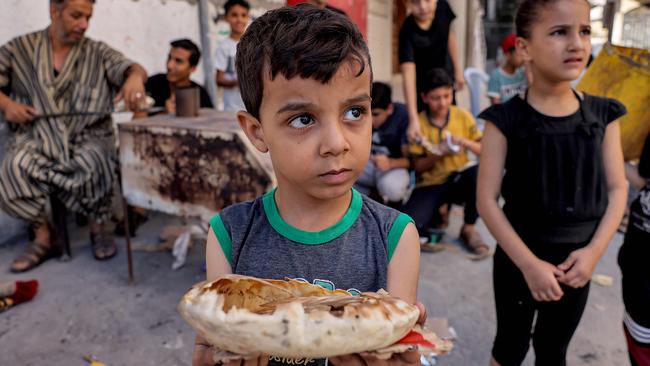Hunger spreads in Gaza as Israel tightens blockade
Bakeries are shutting down and essential food supplies are running out; ‘We eat little’.

Hunger is spreading in Gaza as Palestinians living in the enclave grow increasingly desperate in their search for bread and other essential foods after Israel imposed a total siege on the enclave in response to Hamas’s deadly Oct. 7 attacks.
The bakeries that supply Gaza with bread are shutting down because of lack of flour and fuel for their ovens. Those still working are serving lines of hundreds of people waiting for hours to buy bread. The price of what food remains in shops -- mostly dry goods and vegetables -- is soaring to levels many can’t afford.
“We eat little amounts to save the rest for later and for the children,” said Maree Abdul Kareem, 43, a civil servant living with her family in Deir al-Balah city in central Gaza. “I expect the worst yet to happen.”
The World Food Program estimates that Gaza’s supplies of essential foods will last another seven days, according to an update late on Monday from the United Nations Office for the Coordination of Humanitarian Affairs.
Israel cut off all supplies of food, water, fuel and electricity to the Gaza Strip in response to the Oct. 7 attacks by militant group Hamas that killed 1,400 Israelis. Israel has allowed the delivery of small amounts of humanitarian aid to Gaza since Oct. 21 but has opposed the delivery of fuel to the strip out of concerns that Hamas, which is designated as a terrorist organization by the U.S., would use it for military purposes.
According to Hamas-controlled health authorities in Gaza, Israel’s military operation has killed more than 8,000 Palestinians in the enclave, the majority of whom are women and children, since Oct. 7. The figure doesn’t distinguish between civilians and combatants.
Israel says it will allow more aid to flow into southern Gaza but so far deliveries have been limited.

“These deliveries are a drop in the ocean compared to the vast scale of needs,” said Martin Griffiths, chief of the U.N. humanitarian and emergency relief office, in remarks delivered by one of his deputies to the Security Council on Tuesday. “The scale of the horror people are experiencing in Gaza is really hard to convey,” he said. “We have very real fears about what lies ahead. The current situation in Gaza may pale in comparison with what is to come.”
A small coastal enclave, Gaza largely depends on food from Israel and Egypt. Before the war, more than half of Gazans lived under the poverty line, largely the result of an economic implosion that followed Israel’s decision to seal off the strip after Hamas won a Palestinian legislative election in 2006 and then seized control of the enclave in 2007. That ended decades in which many Palestinians living in the enclave worked inside Israel and moved freely throughout the country. Israel increased the number of work permits for Gazans in recent years, but those permits applied to a tiny fraction of the territory’s workforce.
Some humanitarian aid has entered via Egypt after difficult negotiations between Israel, Hamas, and the Egyptian government. Roughly 58 of the 143 trucks that have entered since Oct. 21 carried food that is being distributed to the nearly 700,000 people sheltering in U.N. installations throughout the strip, out of a total of 1.4 million internally displaced people.
Oxfam International, a humanitarian group, estimates that only about 2% of the food required to feed Gaza’s population has been delivered since Oct. 7, citing an analysis of U.N. data on aid deliveries. Nearly everyone in Gaza is now food insecure, meaning they don’t know for sure where their next meal is coming from, the group says.
“The situation that we’re seeing right now cannot last for much longer. We’re about to witness a humanitarian catastrophe unless the border is opened and more food is allowed in,” said Ruth James, the Jerusalem-based regional humanitarian coordinator for Oxfam International.
For ordinary people in Gaza, the search for food has become an exhausting daily chore that involves waiting in line for hours for bread and braving airstrikes to venture out to shops.
Mohammad Jaafar, a resident of Rafah, said he has to wake up at 3 a.m. most days to line up for bread, waiting for up to six hours.

“After you finish the bread line around 10 a.m. there’s the water line. That’s another struggle. You have to carry the water in gallons. And after that, you go to the marketplace and there is another line,” he said.
“There is nothing available in Gaza,” he said.
Aseel Mousa, a 25-year-old freelance writer, said she and her family fled her home in northern Gaza to the central area of the strip in hopes it would be safer. “Really, we’re fleeing from death to death.” She said where she is staying, bakeries are nowhere to be found -- they have been bombed or closed. And with gas and electricity in desperate supply, many people are using wood to cook or make bread. Perishable food often isn’t an option given there is no electricity to keep items refrigerated. Her family mostly eats whatever dry goods they can obtain at the markets still open.
“Fresh water has become like a miracle,” she said. “We barely find any, and when we do we try to drink limited quantities to save what we have.” Kareem, the civil servant, said her family was mainly eating vegetables, potatoes, onions, and tomatoes that she buys at a premium at local shops. Two cousins that fled Gaza City are sheltering in her house, raising her grocery bill, she said. Twice, she left the house to buy food and then airstrikes sent her running home.
“I was here in the previous wars. This is very different. We always had water even for two hours a day, electricity even two hours every 2-3 days,” she said.
Abu Bakr Bashir and Omar Abdel-Baqui contributed to this article.
The Wall Street Journal



To join the conversation, please log in. Don't have an account? Register
Join the conversation, you are commenting as Logout